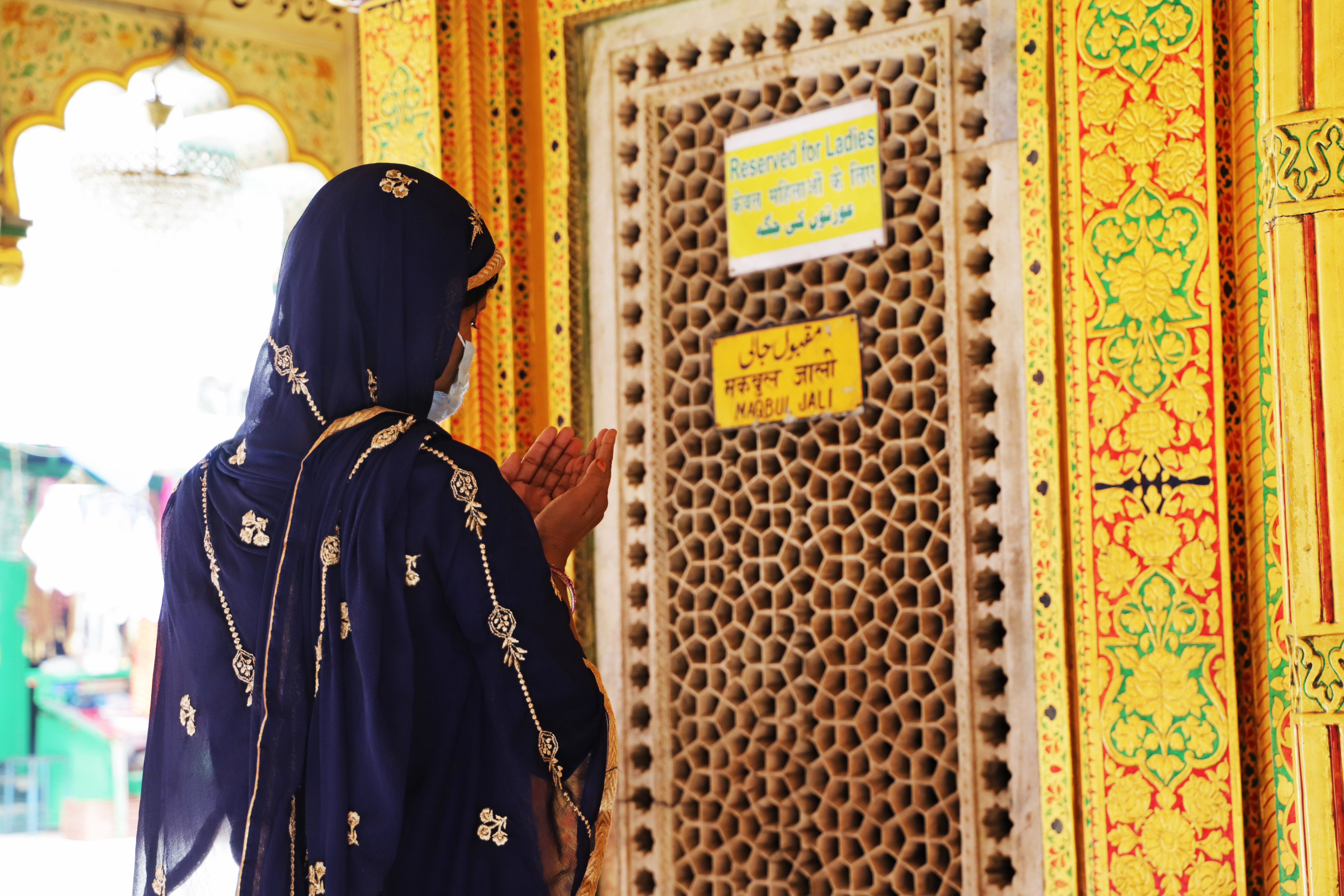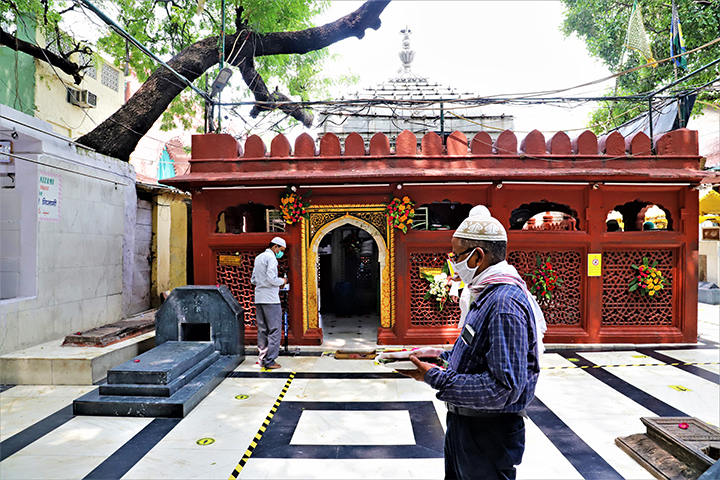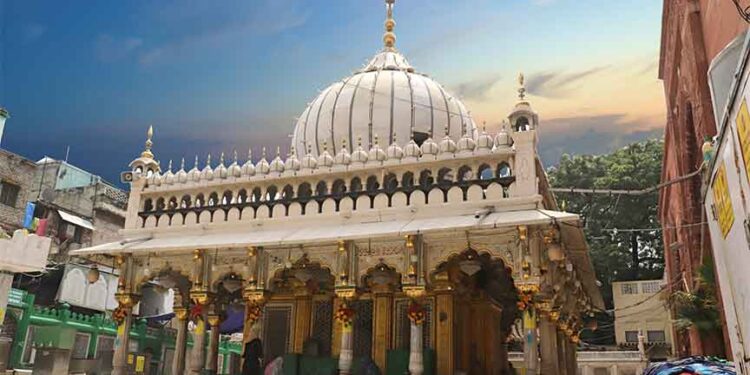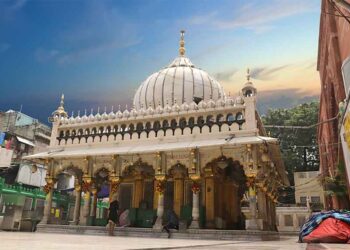Amir Khusraw not only synthesised the Perso-Indian cultural traditions in his poetry but also became an agent of cultural integration and inter-faith dialogue
By Akhlaq ‘ahan’
Chhap tilak sab cheeni, Mohse naina milaike
Premwati ka madwa pilai ke, Matwari kar deeni mohse naina milaike
(You have snatched away all trace of me with one glance of your enchanting eyes.
By making me drink the wine of love-potion, you’ve intoxicated me by just a glance.)

Amir Khusraw’s poetry is a treasure trove of such immortal lines that take us to sublime heights of spiritual love. Being a scholar and Sufi, he had deep understanding of Islam as well as Indian religious, cultural and philosophical traditions. Interestingly, he utilised different dictions, phraseology and stylistics in his Persian and Hindawi poetry as the two obviously represented different socio-cultural conditions. He is, in fact, credited as the one who initiated the Hindawi tradition. In his Persian Sufi poetry tradition, the Almighty or the ultimate beloved is symbolized as lass or saqi i.e. cup-bearer and the different aspects of her beauty make the lover fervent and crazy.
Beya saaqi ke maa der may fataadeem
Be khid’mat pishe may-khwaraan satadeem
(O Saqi! Please come, as we have fallen into the wine; and we have now put ourselves at the disposal of drunkards.)
Khabaram rasida imshab ke nigaar khwahi aamad
Sar-e man feday-e raahi ke sawaar khwahi aamad
(I received the news tonight that the beloved would come; therefore I am ready to sacrifice on the way which would bring the rider.)
Be labam rasida janam, to biya ke zinde maanam
Pas azin ke man na maanam, be che kaar khwahi aamad
(I am about to die, O beloved! Do come so I may survive; and if you would arrive after I die, it would be but futile.)

Khusraw, while writing in Hindawi, unlike his Persian ghazals, synthesizes both the traditions, which is the first experiment of its kind in Hindawi. For instance, when he writes on the departure of Hazrat Nizamuddin, he says:
Gori sowey sej par mukh par darey kesh
Chal Khusraw ghar aapney, rain bhayi chau desh
(The fair maiden rests on a bed of roses, and her face is covered with a lock of hair;
Oh Khusraw! Let’s return home now, as the darkness has encompassed all around.)
He calls his spiritual master a beloved after the ultimate beloved i.e. the Almighty God; his poetic experimentation amuses everyone, as he says:
Woh aaye tab shaadi hovey,
Us bin dooja aur na koye;
Meethey laagen wa ke bol.
Aye sakhi saajan? Na sakhi dhol!
(Marriage cannot be initiated without his presence, and no one can be his substitute; And he sounds so sweet. Is it the beloved? No dear, it is the drum!)
Similarly, when he composes the typically unparallel bi-lingual poem of Persian and Hindawi (i.e. Ze hale miskin…….), he incorporates both the traditions.

Khusraw’s portrayal of India
Khusraw’s portrayal of the different aspects of India shows his profound understanding of the multi-layered nation including its beauty, magnificence and superiority among the countries of the world. The people and local inhabitants, languages, animals, religions and culture of the nation are expressly described in his long poem Nuh-Sepah’r, which is undoubtedly the greatest literary work eulogising India. Beside this, his other works especially Qiranus-sa’dain too elucidate different aspects and shades of the land.
According to him the dominating planet of India is Saturn since the inception, therefore he derives the idea of her greatness from Saturn. In Nuh Sepah’r, he says that though the kingdoms, countries and regions like Rome, Khurasan and Khotan claim to be superior and are generally considered so, in his view none of these could be closer to the heavens than India, and he believes that being the son of the soil it is his duty to highlight and raise her greatness to the heavens.
Khusraw emphasises that India is the cradle of knowledge among the world’s civilisations and though disciplines like medicine, philosophy, logic, arts and sciences exist in other parts of the world too, philosophical insight is much deeper in this region of the earth. He is so consumed by the love of the land that he claims to be destined to be born in India and says while quoting the Prophet that loving the motherland is part of the faith. Calling this land great as his spiritual master Hazrat Nizamuddin belongs to this place, he declares:
Hasht azimat chu seh’r-wari
Kaz pa-ye Hindam in bowad jalwegari
(I aim to craft a magical world of poetry for India, my country.)
Geographical Beauty of India
Amir Khusraw’s eyes could see the beauty and magnificence of India peeping and gleaming through every aspect of her life which ranges from the natural environment to the elements of society and culture. He begins with his first argument that in India the cold wind is not harmful as people here just need a cloth to save them from the cold and people in Khurasan suffer even after wearing ten layers of cloths.
India as paradise on earth
Khusraw believes that India is paradise on earth. As he wrote on Kashmir:
Agar firdaus bar roo-e zameen ast,
Hameen ast-o hameen ast-o hameen ast.
(If there is a paradise on earth,
It is this, it is this, it is this.)
According to him, Adam was sent to the earth after he committed a mistake in paradise. According to Khusraw, since he was used to living in paradise, therefore he was sent to India, the only place on the earth a paradise dweller could have been dispatched. If he had been sent to China, Arabia or Khorasan, he could not have tolerated the extreme and tortuous climatic conditions of these regions.
Indian people, the knowledge, tradition and culture
In Khusraw’s view, India is so fertile culturally and intellectually that poets, composers and singers rise from this land in abundance and turn it into a beautiful garden of melodically singing birds. Majority of these poets and singers are brilliant in their area and their compositions are filled with delicate connotations as they are aware of its deepest secrets. Khusraw says that he too knows the innermost secrets of these arts like poetry and music, as he too has learnt in the company of masters, who revealed to him the inmost shades of the art, and therefore has earned uniqueness of expression like other masters. This is indeed the gift of God who has bestowed upon the people of India the precision of insight and perception of a subject and temperament of the people of diverse cultures and regions of the world as if a shepherd is aware of the innate and minute behaviour of his sheep. This is the reason why people from different parts of the world like Arabia, Rome or Khurasan do not face any feeling of being strange as they are treated and entertained by Indians in a manner which delights them and makes them feel at home. Indian culture makes Indians great hosts and heart-winners.
Amir Khusraw says India is a country of intellectual superiority. The Brahmins of India outshine even Aristotle as far as the mastery over knowledge and scholarship is concerned. They possess greater acquaintance with philosophy as enunciated by Rumi.
Indian Languages
Amir Khusraw had mastery over many regional languages of India besides Persian, Turkish, Arabic and Sanskrit. In his magnum opus Nuh-Sepah’r while talking about Arabic, he praises its being based on fixed rules and grammar which restricts errors and confusion. It is known around the world for its beauty and the scholars of the language are everywhere. But it requires extremely hard work to have mastery over it. On the other hand, Turkish being the language of official use and administration, most of the people attached to the administrative work converse in it. Persian which has its centre at Shiraz is the second most important language of scholarship after Arabic and is the repository of knowledge and scholarship. This sweet language too like Arabic is spread everywhere and became popular among both the elite and the common masses. For instance, Baghdad is the land of Arabs but to learn Persian etiquette both the commoners and elite learned this language. Even the name Baghdad is a conjoining of two Persian words i.e. Bagh-e-Daad, which means garden of justice.
He says that Hindawi is India’s language and besides it there are other local languages in different regions, and since he belongs to India he loves to talk about these regional languages of the country such as Sindhi, Lahauri, Kashmiri, Kubri, Dhur-Samundari, Tilangi, Gujari, Maabari, Ghouri, Bengali and Oudhi.
But among all these languages, the best language is Sanskrit. Arabic and Sanskrit are similar as both have set rules of grammar, its system, definitions, and literature. Four great books i.e. Vedas are written in Sanskrit, but everybody is benefitted by these books. Everyone who is attached to literature and art gets inspiration from the Vedas, the source of all learning. He says if he had command over this language, he would have loved to praise and compose a panegyric for the King in Sanskrit.
Thus, Khusraw not only synthesized the Perso-Indian cultural traditions in his poetry but also became a cultural icon of both the traditions and influenced and attracted the intelligentsia as well as the common folk towards cultural integration and dialogue. The message of universal love propagated by Sufis in general and Chishtia Sufis like him in particular, besides creative experimentations, have become more relevant today when the identity politics germinated by the colonial politics aims to divide people in the country in the name of religion, language, region and creed. Nonetheless people across different languages including Hindi, Urdu, Awadhi and Punjabi own Amir Khusraw as the founder of these languages. At the same time masses of diverse faiths pay their homage to Khusraw and his Sufi predecessors with equal fervour and devotion.
The author is Professor, Centre of Persian & Central Asian Studies, JNU, New Delhi.



